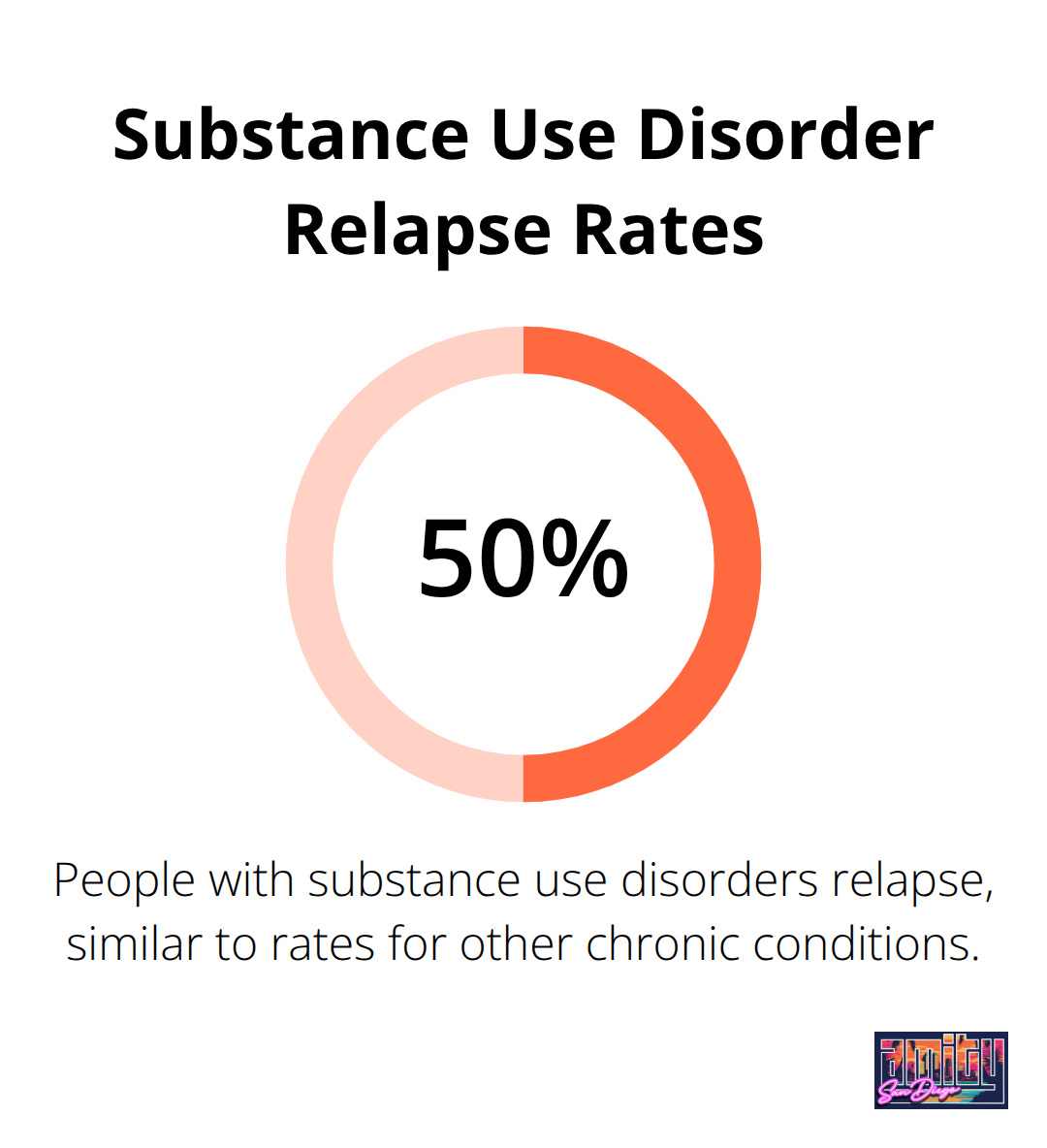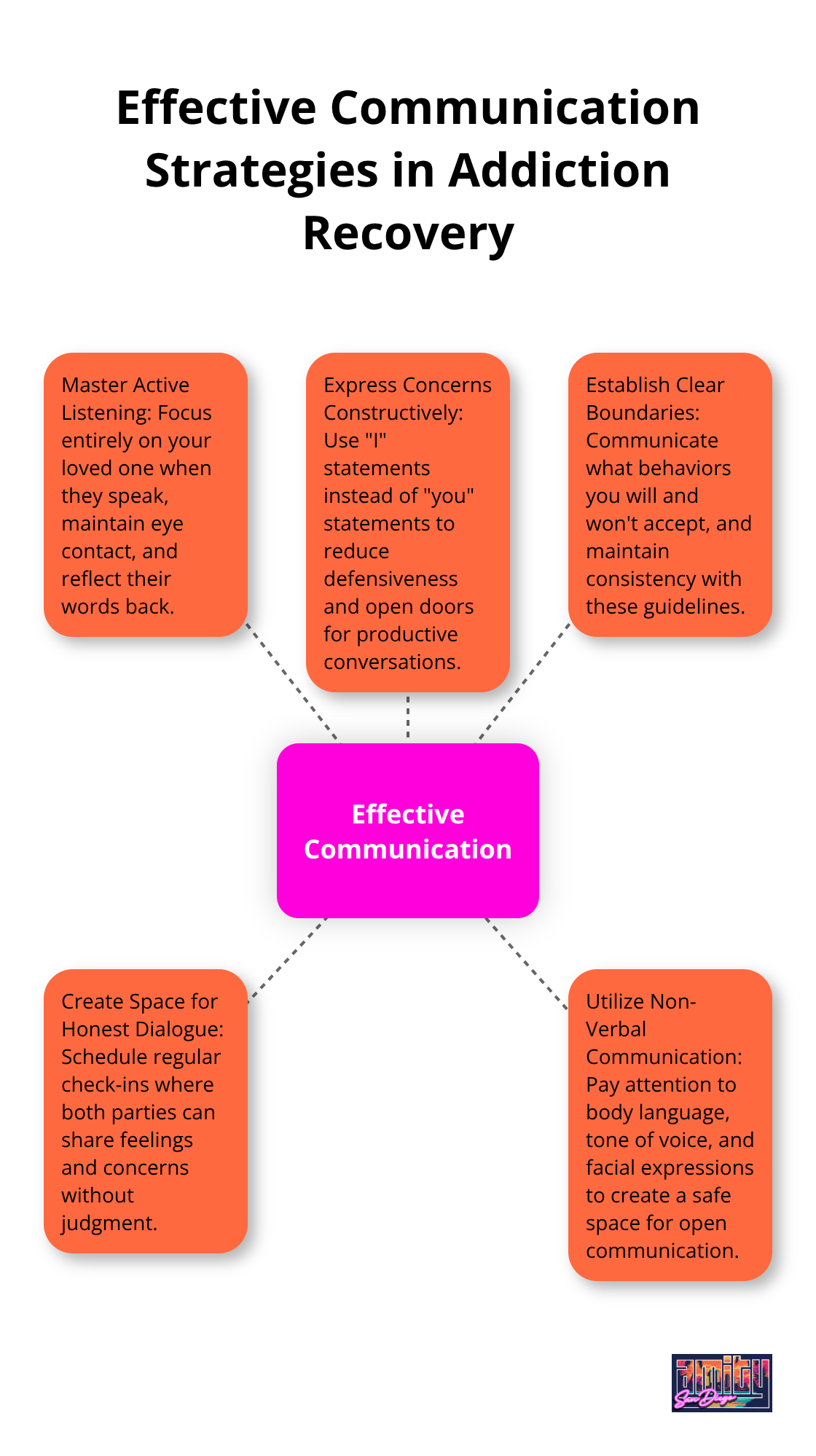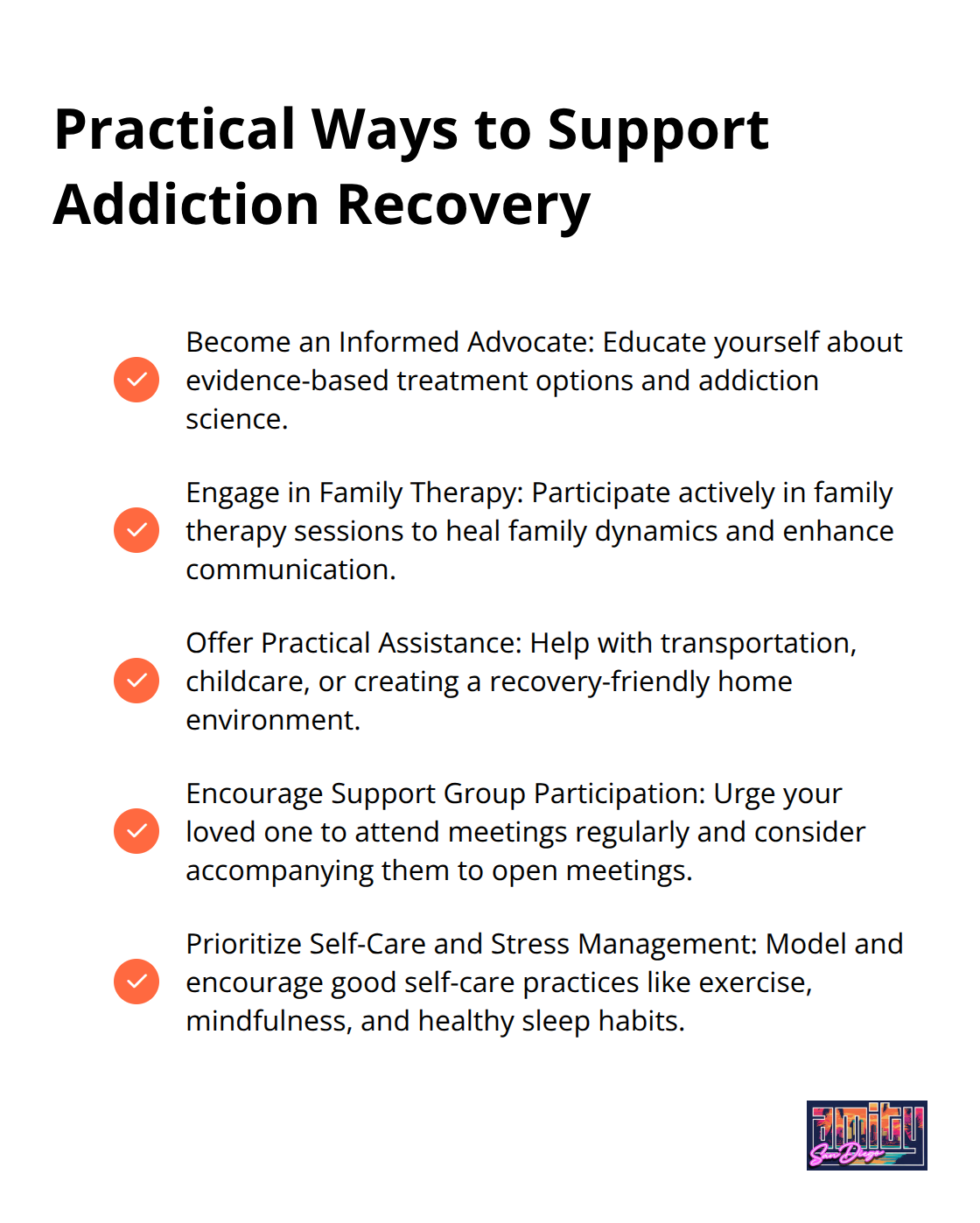At Amity San Diego, we understand the challenges families face when supporting a loved one in addiction recovery.
Addiction recovery family support is a crucial aspect of the healing process, yet many struggle to find effective ways to help.
This guide offers practical strategies to empower you in your role as a supportive family member, fostering a healthier environment for recovery and growth.
Understanding Addiction and Its Impact on Families
The Chronic Nature of Addiction
Addiction is a complex brain disease that affects millions of Americans and their families. It’s not a moral failing or lack of willpower, but a chronic illness that alters brain chemistry and behavior. The National Institute on Drug Abuse reports that 40-60% of people with substance use disorders relapse, similar to rates for other chronic conditions (like diabetes or hypertension). This underscores the need for ongoing support and treatment.

Stages of Recovery and Common Hurdles
Recovery isn’t a straight path. It often involves several stages, each with unique challenges:
- Pre-contemplation: The person doesn’t recognize their addiction as a problem yet. Family members often feel frustrated and helpless.
- Contemplation: The individual considers changes but feels ambivalent. Families can encourage professional help at this point.
- Preparation/Action: The person decides to make changes and starts treatment. This stage often brings hope but can also cause stress as new routines form.
- Maintenance: Focus shifts to preventing relapse and building a sober lifestyle. Families play a key role in supporting new, healthy habits.
- Relapse (if it occurs): While disappointing, relapse often forms part of the recovery process. It’s an opportunity to refine treatment plans and coping strategies.
How Addiction Reshapes Family Systems
Addiction doesn’t just affect the individual – it transforms entire family systems. Common impacts include:
- Codependency: Family members might enable addictive behaviors or neglect their own needs.
- Trust issues: Lying and broken promises erode family bonds.
- Financial strain: Substance use often leads to job loss or legal problems.
- Emotional turmoil: Family members may experience anxiety, depression, or trauma.
- Role reversals: Children might take on adult responsibilities when parents struggle with addiction.
Research indicates that families are powerful resources for enhancing treatment and recovery success among individuals with substance use disorders. This highlights the importance of educating and involving families to create a stronger foundation for lasting recovery.
The Role of Family Support in Recovery
Family support can make a significant difference in recovery outcomes. Here are some ways families can contribute:
- Education: Learn about addiction and recovery (through reputable sources and treatment centers).
- Open communication: Create a non-judgmental environment for honest discussions.
- Boundaries: Set clear, healthy boundaries to protect both the individual and the family.
- Self-care: Family members must prioritize their own well-being to provide effective support.
As we move forward, we’ll explore effective communication strategies that can help families navigate the challenges of supporting a loved one in recovery.
How to Communicate Effectively in Addiction Recovery

Master Active Listening
Active listening is a communication skill that helps shift the tone away from anger or lecturing, and engages your loved one in a real conversation. Put away distractions, maintain eye contact, and focus entirely on your loved one when they speak. Reflect their words back to ensure understanding. For example, say, “It sounds like the recovery process overwhelms you. Is that correct?” This technique shows genuine engagement and helps clarify misunderstandings.
Express Concerns Constructively
When you voice concerns, use “I” statements instead of “you” statements. Replace “You always break your promises” with “I feel worried when plans change unexpectedly.” This approach reduces defensiveness and opens the door for productive conversations. Be specific about observed behaviors rather than making broad generalizations. For instance, “I noticed you missed your support group meeting yesterday” provides more helpful feedback than “You never stick to your recovery plan.”
Establish Clear, Consistent Boundaries
Setting boundaries is difficult for people striving to make amends for past behavior; however, the ability to set healthy boundaries is crucial. Clearly communicate what behaviors you will and won’t accept. You might decide not to provide money directly but offer help with groceries or bill payments. State these boundaries calmly and maintain consistency. Remember, boundaries aren’t punishments – they’re guidelines that promote healthy relationships and support recovery (and can be adjusted as needed).
Create Space for Honest Dialogue
Foster an environment where open, honest communication thrives. Schedule regular check-ins where both you and your loved one can share feelings and concerns without judgment. This might involve a weekly family meeting or a daily walk together. Practice patience and avoid interrupting during these times. If tensions escalate, take a break and revisit the conversation later.
Utilize Non-Verbal Communication
Your body language and tone of voice often speak louder than words. Maintain an open posture, use a calm tone, and show empathy through facial expressions. These non-verbal cues can create a safe space for your loved one to open up. Pay attention to their non-verbal signals as well, as they may reveal unspoken emotions or discomfort.
Effective communication skills improve with practice. As you implement these strategies, you’ll create a supportive environment that nurtures recovery. The next section will explore practical ways to offer tangible support beyond communication, including education about addiction treatment options in San Diego and participation in family therapy sessions.
Practical Support Strategies for Recovery

Become an Informed Advocate
Knowledge empowers you in addiction recovery. Educate yourself about evidence-based treatment options in San Diego. The Substance Abuse and Mental Health Services Administration (SAMHSA) offers valuable resources, including Health Care Provider Toolkits with training and information about addiction medicine, naloxone, and clinical practice guidelines. Attend educational workshops at local treatment centers. Understanding addiction science and recovery will help you make informed decisions and provide better support.
Engage in Family Therapy
Family therapy plays a key role in effective addiction treatment. Take an active part in family therapy sessions. These sessions help heal family dynamics, enhance communication, and provide tools to support your loved one’s recovery journey. Each resident receives a tailored treatment plan that addresses their unique mental health needs in intensive residential programs.
Offer Practical Assistance
Recovery often requires significant lifestyle changes. Support your loved one in managing these changes through practical help. This might include:
- Providing rides to treatment appointments or support group meetings
- Helping with childcare during therapy sessions
- Creating a recovery-friendly home environment
- Supporting job searches or educational pursuits
Encourage Support Group Participation
Support groups like SMART Recovery offer valuable peer support. Urge your loved one to attend meetings regularly. Consider accompanying them to open meetings. SMART Recovery is the leading evidence-based addiction recovery program, offering free meetings to help individuals experience a Life Beyond Addiction.
Prioritize Self-Care and Stress Management
Recovery stresses the entire family. Model good self-care practices and encourage your loved one to do the same. This might include:
- Regular exercise
- Mindfulness practices like meditation
- Healthy sleep habits
- Nutritious eating
These practices can support the recovery process.
Final Thoughts
Supporting a loved one through addiction recovery challenges families but offers rewarding outcomes. Effective communication, education, and practical support create a strong foundation for healing and growth. Family support in addiction recovery significantly impacts long-term success, fostering trust and understanding through active listening and healthy boundaries.
We at Amity San Diego understand the importance of family involvement in the recovery process. Our comprehensive outpatient programs provide evidence-based treatment tailored to individual needs. Our experienced professionals offer compassionate care to help individuals and families reclaim their lives from addiction.
For professional guidance and support in addiction recovery, contact Amity San Diego. Our team stands ready to assist you and your loved ones on the path to lasting recovery. Together, we can build a brighter future free from the constraints of addiction.



